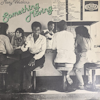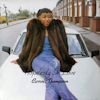Even experienced diggers sometimes overlook gems that are hiding in plain sight at low prices. Most of the music on this record is the sort of thing you’d expect to hear on a mid-’70s record on Muse or Strata-East, or perhaps even a private press out of Philly, D.C., or Detroit. You’d expect to see a bunch of bearded Black men on the cover, and perhaps a quote from the Quran on the back. You wouldn’t expect to see a petite, smiling woman and a few of her friends sitting at the counter of a legendary ’70s Berkeley, California, restaurant/LGBTQ hangout. And the Bay Area’s feminist Olivia Records label was never exactly renowned as a jazz-funk stronghold. Which is why this powerful, compelling, and resonant work can often be found in vinyl spots for five to ten dollars, passed over unknowingly by people in search of something exactly along the lines of what it contains.
Denver-born and Howard University–educated jazz pianist Mary Watkins was a key player in the Women’s Music collective based around the Olivia label in the ’70s, appearing on many of the albums it released. She and singer-drummer Linda Tillery (a veteran of psych band the Loading Zone plus many records by people like Santana, Coke Escovedo, and Lenny White) led the movement within Olivia that spearheaded jazz, funk, and R&B as opposed to the more folky styles that were the label’s stock in trade. This album, which followed Tillery’s own classic self-titled album by a year, was Watkins’s debut LP and it allowed her to give full rein to all the music and ideas that had been steadily welling up inside her. Given the opportunity to put it all on wax, she didn't let the opportunity go to waste. The album kicks off with one of its two more “conventional” tracks, strategically placed at the beginning of each side. “Yesterday’s Children” is an up-tempo vocal song that leans in a somewhat disco direction and provides an accessible point of entry for the average 1978 listener before giving way to the album's true beating heart, an exquisite instrumental waltz entitled “Back Rap,” reminiscent of something Catalyst or Kenny Barron might have done on Muse Records in the mid-’70s.
“Back Rap” is followed by the second of the album’s three vocal tracks, a funky tribute to the Berkeley LGBT diner pictured on the cover, “Brick Hut.” It recalls something from Patrice Rushen’s early Prestige albums and features a resplendent vocal harmony on the chorus. “A Chording to the People” is another instrumental with a flowing, spiritual feel, which is created throughout the album by Watkins’s use of both acoustic piano and Fender Rhodes, as well as a Minimoog, ARP, and even the Moog-adjacent Crumar synth. All of these really come to the fore on the album’s centerpiece and standout track, “Witch’s Revenge,” a brooding fusion excursion that also spotlights a corrosive lead guitar solo by Jerene Jackson. You could blindfold someone and tell them they were listening to Return to Forever and they’d have no choice but to believe you.
Altogether, this adds up to a record that would probably sell in the high three-figures if it were a private-press self-release from the spiritual jazz underground scene in places like Philadelphia, Detroit, or Virginia. It’s not something most collectors would expect from a Bay Area feminist/lesbian collective whose records were entirely created by women including the engineers and the graphic designers. Now, to be sure, many of Olivia’s releases sound pretty much along the folky lines you would expect, but beneath that surface lie a handful (such as this one, Linda Tillery’s album, several Teresa Trull albums, and amazing releases by bands such as Baba Yaga and Bebe K’Roche) that upend those stereotypes and expectations and are well worth making the effort to track down. In the case of this underground Mary Watkins classic, you may even be surprised at how easy it is to come across and how little you'll have to pay for an album that sounds much more expensive that it actually is.


